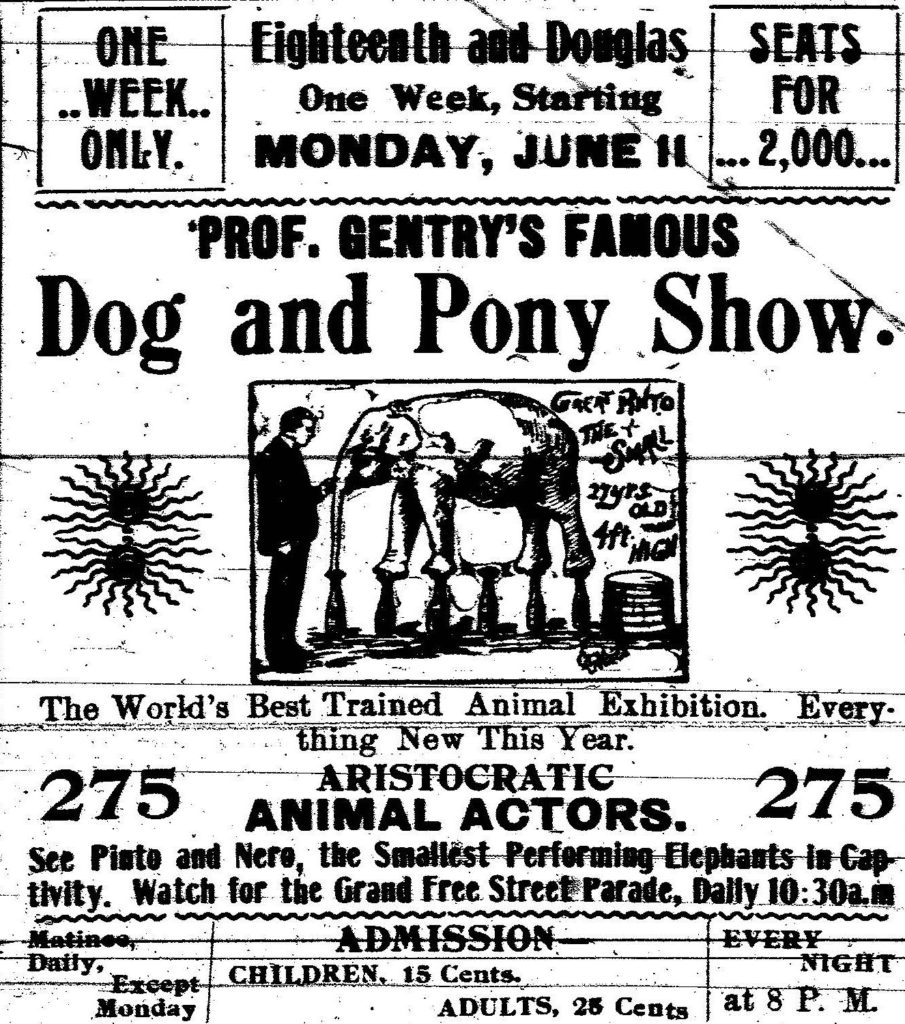Welcome to our new weekly series, “Timeline Tuesday.” Every Tuesday, we’ll post a brief Nebraska history story. The late NSHS historian and Nebraska History Associate Editor Jim Potter authored these columns, which are also printed in newspapers around the state.
 Omaha Sunday Bee, June 10, 1900.
Omaha Sunday Bee, June 10, 1900.
Today, “dog and pony show” is a term of derision applied to pretentious or over-dramatized performances or presentations lacking substance, or failing to meet the audience’s expectations. That was not the case during the late nineteenth and early twentieth centuries when actual dog and pony shows, particularly those presented by Henry B. Gentry and his brothers, were considered not only credible, high-quality entertainment, but suitable fare for all ages and genders. According to a story appearing in the October 1917 issue of The American Magazine, as a youth in Bloomington, Indiana, Gentry trained several of his own pet dogs to do tricks. When a traveling animal troupe came to town, young Gentry was hired to accompany the show and “wash dogs.” A year later the troupe’s proprietor went broke and Gentry found himself “with three crates of hungry, but highly trained dogs on his hands.” Apparently that was the genesis of a business that soon involved Gentry’s three brothers and made him a wealthy man. By 1895 four Gentry dog and pony shows traveled the country. Later, elephants and other trained animals were added, with the show evolving into a full-fledged circus. By 1910 the Gentry Brothers Circus was said to be the largest traveling show in the United States. About 1916 Gentry sold out for an alleged $100,000 and became manager of the Sells-Floto Circus. The Gentry shows often played Nebraska, though which brother was in charge of any given show is not known. On July 5, 1901, the show came to Central City. The company consisted of 124 dogs, 63 Shetland ponies, 25 monkeys, and 3 small elephants named “Pinto,” “Alice,” and “Little Jim.” “Professor” Gentry had added a new feature for the 1901 season, called “Night Alarm.” According to the Central City Nonpareil, “It is a fire scene, an everyday episode in metropolitan life, in which animal actors take the place of firemen, the dogs and monkeys portraying the parts of life and property savers in a most exciting and amusing manner.” Following the show, the paper noted that “the remarkable intelligence exhibited by the animals is very surprising. The Gentrys have reached the height of animal training and give a clean, credible performance.” A performance in Omaha in May 1899 inspired the Omaha Daily Bee to rhapsodize, “There is something about an exhibition of trained animals that appeals to almost everyone, man, woman, and child, which only the coldest hearted of humanity fails to appreciate. . . . [The show] cultivates in the heart of everyone who attends it a kindlier feeling for all things of the lower world. The dog and the pony, for instance, are looked upon in a different light, and there are less cruel words and complaints than there were before.” Admission was then 15 cents for children and 25 cents for adults. The show’s tent could seat two thousand. In June 1914, when Gentry’s show was at its peak, it played in Omaha for a week at several venues and included not only trained dogs, ponies, elephants, and monkeys, but also cats, pigs, sheep, goats, and horses. To learn more about the programs and services of the Nebraska State Historical Society, call 1-800-633-6747 or visit our website at https://historynegov.wpengine.com



